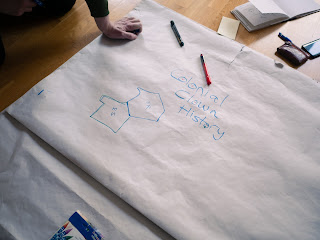Decolonising Clowning
From the beginning of this project, we knew that one element of our research would be a self-examination of our own practices and histories. Over the past two years working remotely, we had all in some way come up against the problematic assumptions in much contemporary clown performance and pedagogy. These cover a number of areas, such as:
- the individualistic vision of clowns as personal: depoliticises clowns
- the binary of inner/outer, where the inner is supposed to hold the truth: ignores societies structures
- clown as self-help and life-coaching: presents specious claims to relieve anxiety and suffering
- the notion that clown is an invariable and definable thing: ignores non-European cultures and also our own European history
- the assumption that clowns appear in training under duress/shame, whether playfully or cruelly: leads to the dominance of clown teachers, mostly white cis het men
- the assumption that clowns appear when you show vulnerability: ignores the structural vulnerability of many identities which are not privileged
- the export of European notions of clowning around the world via red nose clown teaching: neo-colonialism and the erasure of local forms
- the export of European clowning via charity: white saviour complex, funding stays with privileged
- the monetisation of clown teaching: we have based our careers on this
- the continued association of clowns with behaviour that is normal for some neuro-diverse and disabled people: exclusion form clowning for these groups, as well as continued ableism
- the denial of racism in the history of clowning (blackface, ethnic comic types): continued lack of awareness and exclusion
What ways out of these problems have we already identified?
- refocusing training away from vulnerability and/or failure and towards empowerment: clowning as an opportunity to CHOOSE new behaviour, chaos, rule-breaking, expectations.
- active work with non-European forms of clowning
- active work with pre-contemporary forms of European clowning: circus and pre-modern (carnival and other festivities)
- rigorous questioning and re-evolution of all common terms and concepts
- amateur practices: such as carnival preparations
- saying 'no'
Also, what aspects of clowning do we wish to re-centre and foreground?
- the ability for clowning to play with power relationships
- laughter as the reliever of the burden of meaning
-
In order to go deeper into our self-questioning and assumptions, we began work on a map of our own lineages. This included where and with whom we learned (either formal training or apprenticeship), who our teachers learned with, and where we have taken our practices around the world.


Comments
Post a Comment